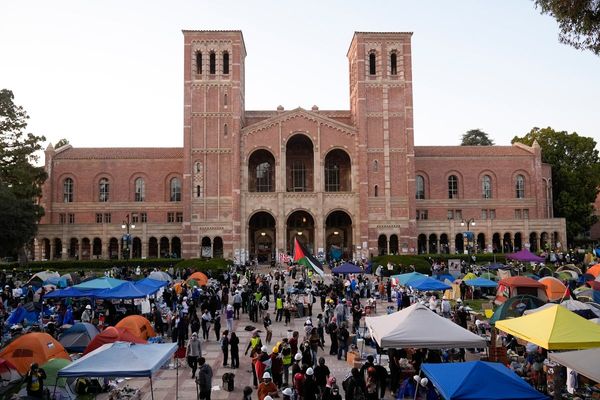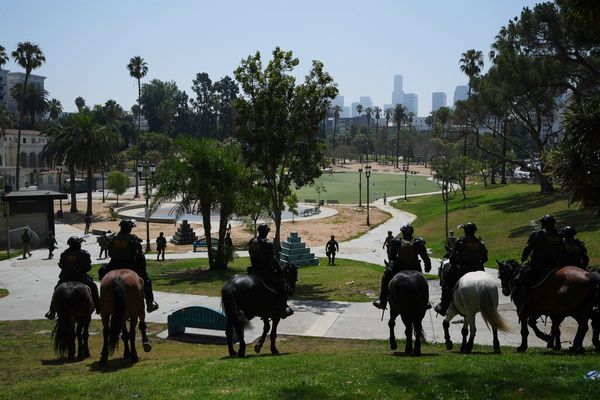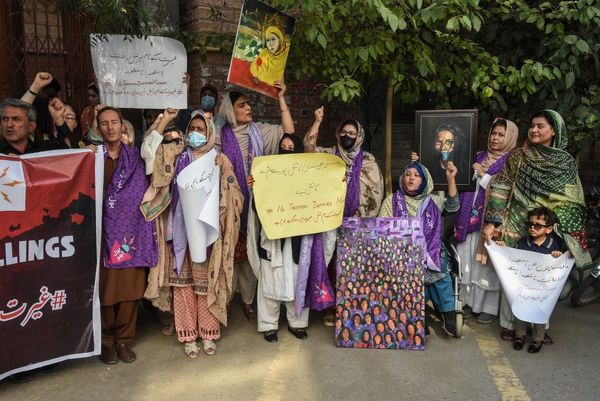Former premier Muhyiddin Yassin and veteran opposition leader Anwar Ibrahim are locked in a race to become Malaysia’s next prime minister. Whichever man wins power will have to contend with an increasingly popular hardline force.
Parti Islam Se-Malaysia, or PAS as it’s known, won the most seats of any single party in Saturday’s election, more than twice as many as Muhyiddin’s own group, and is poised to hold considerable sway in government if he clinches the top job. Should it go to Anwar, PAS will wield its influence as a key part of the opposition. The party has a long-stated objective of transforming Malaysia into an Islamic state, prompting concerns its ultra-right agenda may damage the country’s democracy and economy.
King Sultan Abdullah Sultan Ahmad Shah invited Anwar and Muhyiddin to the palace Tuesday as he deliberates over who to appoint as prime minister. Muhyiddin said he turned down a request from the monarch to form a unity government with Anwar’s coalition, saying his alliance had a majority in its own right. The king plans to meet members of a third coalition, Barisan Nasional, on Wednesday, to assess which side it wants to back.
Scores of ethnic Malay voters rejected Barisan Nasional, which has ruled Malaysia almost without interruption since independence but has been tainted by corruption scandals including the plundering of state fund 1MDB, in the weekend vote. But instead of voting for Anwar’s reformist Pakatan Harapan coalition, they turned to PAS, giving the party a strong boost in seats and establishing it as a force in Malaysian politics.
The swing comes after about 6 million young voters were registered to cast ballots for the first time as the country lowered the voting age to 18 from 21, although it’s not clear how they voted.
PAS “will have a lot of influence” if Muhyiddin leads the next government, said Johan Saravanamuttu, professor emeritus of Universiti Sains Malaysia. “You have to reward the people who voted for you.”
Malaysia’s population in 2021 was estimated to be 32.7 million, with bumiputera, a term that means “sons of the soil” and refers to Malays and indigenous peoples, accounting for 69.8%, following by Chinese at 22.4% and and Indians at 6.8%. Government policies give preferential treatment to bumiputera, traditionally seen as disenfranchised, in areas such as public-sector jobs, housing and higher education.
PAS has for years pushed the federal parliament to allow it to implement strict Islamic laws in the eastern states of Kelantan and Terengganu, which it controls. The party’s chief, Abdul Hadi Awang, has said that should his party take the lead in government, non-Muslims will only have a secondary role. Muslims would set policy while non-Muslims would carry it out. Far-right PAS has also painted multiracial parties as anti-Muslim and anti-Malay.
Previously, PAS was instrumental in pushing through a ban to limit the sale of alcohol in convenience stores in Malaysia’s capital and was seeking to implement that nationwide. Small diners are now required to apply for a prohibitively expensive license to sell alcohol, while many in PAS want to shut sports-betting operators and the nation’s only casino.
Muhyiddin, a survivor of pancreatic cancer who led Malaysia for 15 months during the Covid-19 pandemic, has already lost the prime minister job once due to an unstable alliance, and will be keen not to do so again if he wins. His Malaysian United Indigenous Party is considered to hold what are by Malaysian standards moderate views on race and religion.
If Anwar becomes prime minister, his coalition is likely to have a razor-thin majority and be vulnerable to opposition attacks.
Whoever gets the top job will have to navigate the challenges of dealing with PAS while also attempting to fix a fragile economy being dragged down by the rising cost of living.
Observers are particularly worried that a government containing PAS may put more scrutiny on sectors such as gaming, alcohol and tobacco. Shares in such companies fell Monday in response to the party’s strong election showing.
“An Islamist-led government will typically try to make the previously functioning democracy into an illiberal one, which would be very challenging for Malaysia,” Oh Ei Sun, senior fellow at the Singapore Institute of International Affairs, said on Monday.
To some extent, Muhyiddin has already shown he’s willing to pander to hardline sentiments. During a recent speech, he appeared to suggest that a group of Jews and Christians backing his opponents were plotting to push “Christianization.” He later said he was taken out of context.
PAS, meanwhile, has sought to assuage concerns, saying in a statement Monday that it won’t implement policies that pressure non-Muslims.
“PAS always respects the diversity and plurality of Malaysia, which comprises various races, customs and religions and recognizes their rights and freedoms to practice their own way of life as under the Federal Constitution,” it said.
To be sure, Malaysian lawmakers have always been pragmatic and the hope is that will happen again this time even if PAS is part of the government, Siobhan Das, chief executive officer of the American Malaysian Chamber of Commerce, said in a Bloomberg Television interview.
“The PN coalition, which includes PAS, has in the past provided some level of stable business environment,” she said.
It remains to be seen how big a role Muhyiddin would give PAS in if he forms a government. PAS is likely to push for cabinet positions, while party president Abdul Hadi Awang could even ask for the deputy prime minister post.
“If that happens, you will definitely have PAS becoming a very important party and then policies will move in the Islamic direction,” said Saravanamuttu of Universiti Sains Malaysia. “It’s almost like a coalition that doesn’t have any non-Muslim, non-Malays.”







